Let’s be real – no one wants to feel like they have to starve themselves just to be healthy. You’ve probably heard the hype around intermittent fasting, and maybe even considered trying the infamous “OMAD” (One Meal A Day) route. But here’s the truth: You don’t need to go that extreme to unlock real benefits. For most men, shrinking your eating window slightly – without cutting out entire meals – is one of the easiest and most sustainable ways to look, feel, and perform better.
Let’s break down why tightening your eating window works, how it syncs with your biology, and how you can do it without tanking your energy, libido, or gym performance.
Why Fasting Works (And Why You’re Already Doing It)
At its core, fasting simply means not eating. You already fast every night while you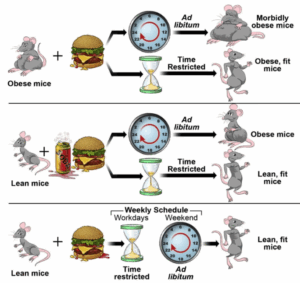 sleep – probably 8 to 10 hours without even thinking about it. Intermittent fasting takes that natural overnight pause and extends it just a bit further to help your body reset.
sleep – probably 8 to 10 hours without even thinking about it. Intermittent fasting takes that natural overnight pause and extends it just a bit further to help your body reset.
When you stop eating, your insulin levels drop, your body shifts into fat-burning mode, and processes like autophagy (cellular cleanup) get turned on. You also get a boost in growth hormone, which supports recovery and muscle maintenance.
The key is to boost this fasting window that’s already happening, specifically by not eating late into the night or munching as soon as you wake up. It’s not uncommon for guys to stretch their eating window over 14–16 hours a day without realizing it, keeping the body in a near-constant state of digestion. That’s a recipe for sluggish digestion, energy dips, poor sleep, and unwanted fat gain.
The Power of the Eating Window
An eating window is the chunk of time during your day when you consume all your calories. The most common intermittent fasting protocols are:
- 12/12 – 12 hours eating, 12 hours fasting
- 10/14 – 10 hours eating, 14 hours fasting
- 8/16 – 8 hours eating, 16 hours fasting
For most men, shifting from a 12-hour to an 8- or 10-hour window can dramatically improve metabolic flexibility without going full caveman.
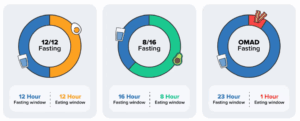
Why does this matter?
Studies show that early time-restricted feeding (eating most of your food earlier in the day) improves glucose control, lowers inflammation and oxidative stress, and helps out with energy levels. Your hormones also prefer it: cortisol and testosterone naturally peak earlier in the day, while melatonin ramps up in the evening to help you wind down. Eating in sync with these rhythms supports better sleep, recovery, and performance.
The Real-Life Benefits for Men
If you’re lifting, running, hustling, and just trying to stay sharp, here’s what happens when you narrow your eating window:
Fat Loss and Body Composition
With less time to snack, you naturally eat fewer calories, without having to obsess over counting them. Plus, you burn more fat in a fasted state while maintaining lean muscle as long as you keep your protein intake solid.
Sharper Focus and Mental Clarity
Many men report feeling more alert and less foggy when working fasted. Fewer insulin spikes = more stable energy.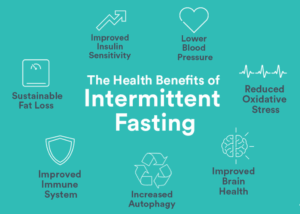
Better Digestion and Less Bloating
Giving your gut more downtime improves digestion and reduces that “stuffed and tired” post-meal feeling. Fasting gives your digestive system a break to repair and reset.
Supports Testosterone Naturally
Shorter fasts (14–16 hours) can support testosterone in overweight individuals and growth hormone production in most populations, especially when paired with strength training and proper nutrition. Just avoid chronic under-eating, which can suppress hormones over time.
You Don’t Need to Go OMAD
One Meal A Day is trendy and useful in certain situations, but for active guys, it’s often too restrictive. It’s pretty damn hard to hit your calorie and nutrient needs in just one massive meal. You’ll likely end up under-eating, losing muscle, and feeling drained, especially if you’re training hard.
Instead, try these realistic eating windows:
- 10 AM – 6 PM (8-hour window)
- 11 AM – 7 PM (good for social dinners)
- 12 PM – 7 PM (easy to follow, minimal change)
- 8 AM – 4 PM (ideal for early risers)
And you don’t need to be perfect. Even just five days a week of a tighter window can give your body a major boost. Use weekends for flexibility. This isn’t about punishment – it’s about pattern recognition and refinement.
How To Start Shrinking Your Eating Window
If you’ve been eating breakfast at 7 AM and snacking till 10 PM, don’t jump straight into a 6-hour window. Ease into it.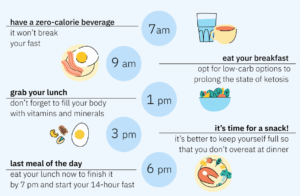
Push Back Breakfast Gradually
Start by eating 30–60 minutes later than usual for a few days. Let your hunger recalibrate.
Cut Nighttime Snacks First
Late-night eating disrupts sleep and blood sugar. Aim to finish your last meal at least 3 hours before bed.
Hydrate During the Fast
Drink water, herbal tea, or black coffee in the morning. Electrolytes (like those by Trace Minerals or just a high-quality salt and lemon water) help prevent the dreaded “low energy” slump and get a good jumpstart on the day.
Train Smart
A lot of guys do okay with fasted workouts, especially cardio, but be careful with strength sessions in the morning – if you’re lifting heavy, make sure to eat a solid carb and protein-rich meal afterward.
Break the Fast Right
Avoid ultra-processed food when you break your fast. Go for protein, healthy fats, and clean carbs (think: eggs, fruit, grass-fed and lean meat, starchy vegetables like potatoes, wild salmon, and greens).
Watch Out for These Common Pitfalls
Too much of a good thing can backfire. Here’s what to avoid:
Undereating
If your carb, protein, or overall calories drop too low, you’ll feel weak, your libido may tank, and your training and recovery will likely suffer.
Obsessing Over the Clock
Don’t panic if you eat at 9 PM once in a while. General consistency over a long period of time is better than stressing to force perfection.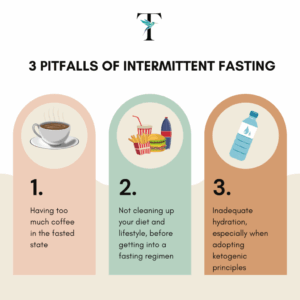
Using Fasting to Justify Junk Food
Tightening your window is not a hall pass for fast food or ultra-processed crap. The quality of your food still matters.
Poor Sleep from Late Meals
Eating close to bedtime spikes insulin and body temperature, making it harder to fall and stay asleep. Don’t just delay eating in the morning and slide the window back to where you’re eating before bed – compress the window on both ends.
Conclusion: Small Shift, Big Impact
You don’t need to jump into extreme fasting protocols to get results. For most guys, simply shrinking the eating window by a few hours and syncing meals with natural energy rhythms can lead to better body composition, improved mental clarity, and long-term health gains.
Start small. Experiment. Keep it sustainable. You’ll be surprised how much cleaner, leaner, and more focused you feel when you stop eating like it’s always snack time.








